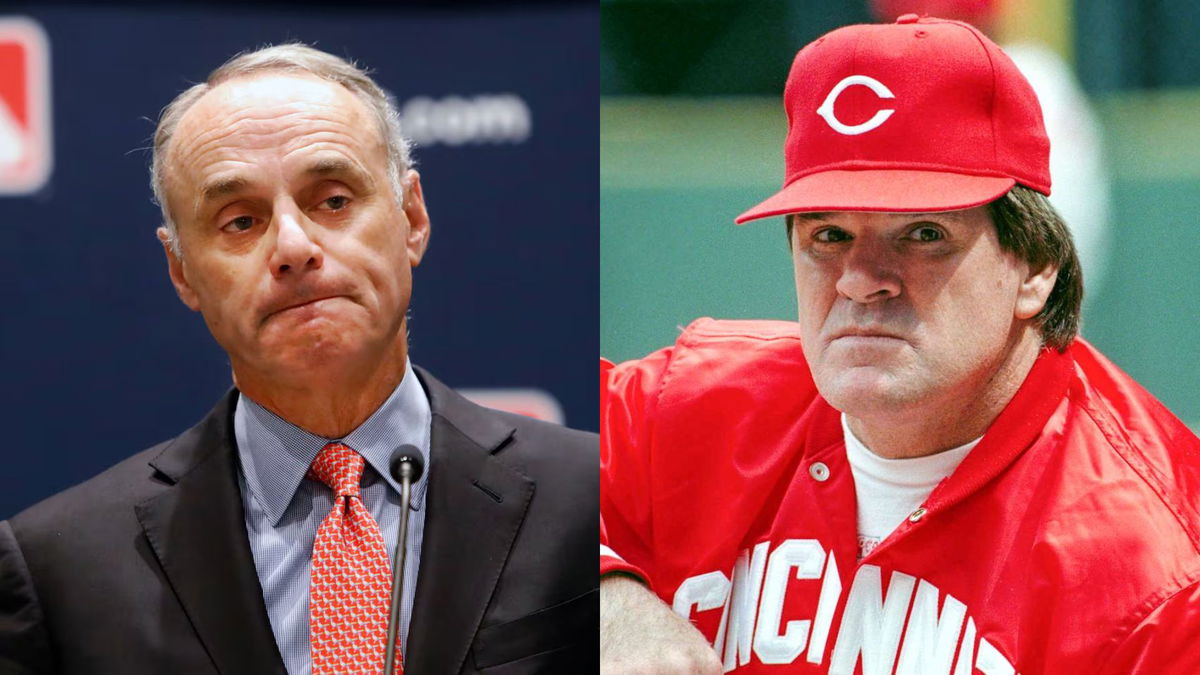
Imago
Credit: LM Otero/Associated Press, Alamy

Imago
Credit: LM Otero/Associated Press, Alamy
To some, it’s a long-overdue gesture of closure that Pete Rose deserves. To others, however, it’s more of an undoing of everything MLB once stood for—integrity. Opinions are divided. However, this division was kinda expected. Amid the debate over holding firm or letting go, a new spark has just been ignited between the son of a former MLB commissioner, who is defending his father’s stance, and the current commissioner, Rob Manfred, who has already made a move.
Watch What’s Trending Now!
Bart Giamatti, the MLB commissioner in 1989, handed Rose, one of the most prolific names in the history of MLB, a lifetime ban. For a whole decade and a half, the Cincinnati Reds‘ legend hid his gambling on the sport while managing the clubhouse. He passed away at 83 in September 2024 without any hope of seeing his name among the Hall of Famers. But now, he has a chance at the induction, all thanks to Commissioner Manfred.
ADVERTISEMENT

Manfred announced the news on the special day of May 14, when Cincinnati honored the legendary Charlie Hustle at Great America Ball Park. Now, he is likely to be considered for the Hall of Fame even after his death. While the long-time Rose loyalists were grateful for it, there was 63-year-old Marcus Giamatti, son of Bart Giamatti, who was utterly baffled by Manfred’s decision. And he didn’t hold back from expressing his unfiltered thoughts on the subject.
ADVERTISEMENT
Disappointingly, he told USA TODAY Sports, “It’s a serious dark day for baseball.” After all, there’s a reason why his father imposed the lifetime ban on Rose. “For my dad, it was all about defending the integrity of baseball.”
He added, “Without integrity, I believe the game of baseball, as we know it, will cease to exist. How, without integrity, will the fans ever entrust the purity of the game?” Marcus believes baseball’s principle of fair play is being compromised with the lifting of Rose’s ban. Well, for now, it’s the ban that has been lifted. Moreover, if Rose is inducted into the Hall of Fame, it won’t be before 2028. Because Marcus views lifting Rose’s ban as a violation of baseball’s integrity, Commissioner Manfred felt compelled to clarify that.
ADVERTISEMENT
Rob Manfred subtly responded to Marcus’s statements
For Marcus, lifting Rose’s lifetime ban was a violation of the MLB’s integrity. However, that’s not how Manfred views this move, stating Rule 21 was not at all violated. This rule firmly prohibits MLB individuals from betting on baseball games in any form. Now, in Manfred’s view, since Rose has passed away, he has already served the purposes of this rule.
Manfred has a clear stance. He stated, “A person no longer with us cannot represent a threat to the integrity of the game.” Thinking it through, it does make sense. For the rules Rose violated in 1989, he has already served his punishment. He faced a lifetime ban. Now, Manfred has officially removed him from the ineligible list.
ADVERTISEMENT
Not just Rose, but all those who were on the ineligible list for the 1919 Black Sox scandal have been removed. Some of those key names include Eddie Cicotte, Happy Felsch, Chick Gandil, Joe Jackson, and others. In total, Manfred removed 16 individuals who are deceased and, therefore, no longer need to be on the list.
Top Stories
Kazuma Okamoto Dependence Triggers Blue Jays Reality Check as Bo Bichette Reunion Slips Away

Who Are Kyle Tucker’s Parents? All about Mike Tucker and Lisa Fernandez

Blue Jays Thrown Into Chaos Over Kyle Tucker Pursuit as Don Mattingly Moves to Foil Bo Bichette Hopes

David Stearns Admits Offseason Misstep as Mets Reportedly Roll Out $50M Kyle Tucker Push

Scott Boras’ Intentions Under Scrutiny After Cody Bellinger Outrightly Rejects Yankees’ $155M Offer

Manfred didn’t intend to violate Bart Giamatti’s decision. In fact, he says that his decision is “consistent with Commissioner Giamatti’s expectations.” Moreover, it is not well known. But in 1991, the Hall of Fame decided to make individuals on the ineligible list part of their criteria. It’s just that the effect of Rose’s ban resulted in him being unable to be part of any club.
ADVERTISEMENT
ADVERTISEMENT
ADVERTISEMENT
ADVERTISEMENT

